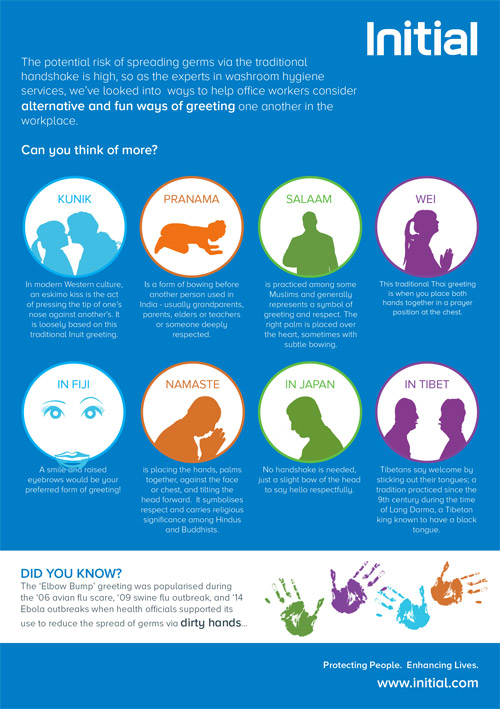Emma Kenny 5 Ways Your Male Colleagues Are Cleaner Than You Think Interview

Emma Kenny 5 Ways Your Male Colleagues Are Cleaner Than You Think Interview
Initial, global leaders in washroom hygiene services, unveiled research into the revealing opinions of men and women on the opposite sex's personal hygiene habits and the subsequent risk of spreading germs around the office. The report, commissioned by Initial and in conjunction with Harris Interactive, found women were less trusting of their male counterparts' personal hygiene habits.
Women in Australia enjoy almost the complete trust of men, with 98 per cent agreeing with the statement that their female colleagues always wash their hands. Unfortunately, this sentiment is not shared when it comes to how women view men. Almost half (43 per cent) said they believe the men in the office never wash their hands.
Emma Kenny, Psychologist, comments: "The research demonstrates the strong stereotypical belief of women being the more hygienic gender. Men, more often than not experience women as their primary care givers. With mothers as their initial role models it is likely that men form opinions that are more positive towards women, because of their attitude towards and experiences of their mother's hygiene standards. Women conversely feel that men have questionable hygiene attitudes and again it's likely these are formed during childhood and reinforced through stereotypical assumptions and judgements about boys and men being less concerned about their appearance and general hygiene."
The potential risk of spreading germs via the traditional handshake is high. Initial has developed a light-hearted and irreverent infographic to help office workers consider alternative ways of greeting one another in the workplace.
For more information, or to download the report, visit: www.initial.com.au/xxx
 Interview with Emma Kenny
Interview with Emma Kenny
Question: What do you hope to achieve this Global Handwashing Day?
Emma Kenny: Good hygiene behaviour helps prevent the spread of germs, and while the majority of us appreciate the importance of good hygiene behaviours, our habits vary greatly across gender, life cycle stages and countries. The problem of course, is that a lack of good hygiene habits or education around hygiene can increase the threat of disease and infections. I hope to encourage people to educate themselves, their family and their workplace on good hygiene behaviors, and to understand how hygiene affects the people around them.
Question: What surprised you regarding the Initial survey results?
Emma Kenny: I think what surprised me the most is how many women in the workplace believe their male colleagues to be unhygienic and lazy. Many women would be surprised to hear that men are so conscientious around hygiene behavior in the office – men do have a real understanding of the importance of bathroom cleanliness.
This is because men are instinctually protective and territorial and these natural predilections could well be why they take care when using their own and others toilets. Survival instinct is a powerful mechanism and we are all aware of how we can prevent sickness and the spread of disease. Men may well be more finely tuned to this information, hence their toilet behavior.
Question: Can you give us an insight into the cleanliness of women vs. men? Why do you think women believe they are cleaner than men?
Emma Kenny: From an early age, many girls are instilled with a stronger identity towards presentation than their male counterparts, whilst boys are, conversely, encouraged to go out and get covered in mud. These schemas affect our belief systems, meaning that girls develop an inherent connection with hygiene.
In the majority of the western world both men and women tend to have excellent hygiene standards, however this particular Initial Hygiene research shows that women, generally speaking, pay more attention to hygiene than men – aside from the workplace; where the research found the men are actually better in the bathroom when it comes to hygiene than women.
The mixed feelings and understanding around how clean we are in our homes opposed to the workplace can be attributed to the fact women seem inherently more predisposed to avoid things that might contaminate them, whereas men seem a bit less concerned for themselves. In the home, women are known to be cleaner and more diligent when it comes to hygiene in the bathroom. However, in the workplace, men understand this environment poses many more threats to their health, and exposes them to a range of different people and therefore hygiene habits, which is perhaps why they are slightly more clean than women.
The 'nature nurture' debate has existed since psychologists began communicating their conflicting opinions on the matter. It makes sense, however, that women have an intrinsic nurturing behaviour, and therefore, are more generally hygienic.
Question: How do we compare to other countries in terms of cleanliness?
Emma Kenny: According to the Initial Hygiene research piece, we can see that across all age groups the female gender from the countries the research covered has a better attitude and better habits when it comes to hygiene. French, British and Australian women were found to wash their hands the most using soap - while British, Australian and Singaporean women also dry their hands more systematically using paper towel than men.
Question: Because of this, how do women prefer to greet men in the workplace?
Emma Kenny: A simple nod of the head and a big smile is always a great way to greet someone in the workplace, especially if it is for the first time. It is hard as the traditional handshake is known to be a way of showing professionalism, so if people don't feel comfortable changing up their traditional form of greeting, I'd recommend being diligent and contentious with your hand washing and general hygiene, especially before meals.
Question: Can you tell us about the Initial infographic regarding greeting one another in the workplace?
Emma Kenny: The infographic illustrates a few different greeting gestures that are used around the world. The gestures are great, as they don't include physical touching. Some of these recommendations could be fun alternatives for greeting people in your workplace!
MORE



